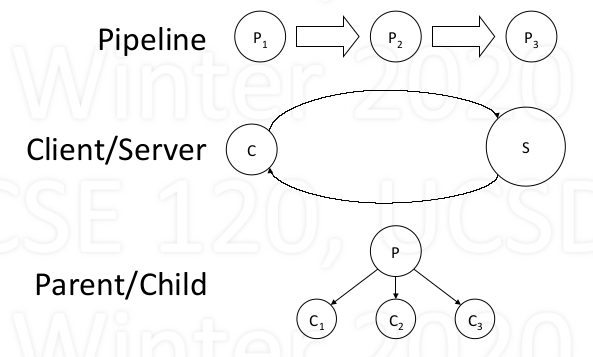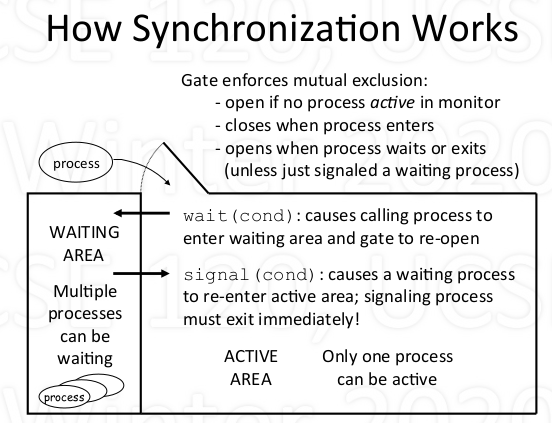本文是我在上UCSD的 CSE 120: Principles of Operating Systems (Winter 2020) 整理的笔记,这一课主要介绍了操作系统里面不同进程之间通信的算法和实现。
Cooperating Processes and IPC
Advantage of Cooperating Processes
- performance: speed
- Exploit inherent parallelism of computation
- Allow some parts to proceed why other do I/O
- Modularity: resuable self-contained programs
- Each may do a useful task on its own
- May also be useful as a sub-task for others
Examples:

- performance: speed
IPC: communication between processes
- IPC requires:
- data transfer
- synchronization
- Three abstraction for IPC
- shared memory + semaphores
- monitors
- message passing
The producer/consumer problem
- Producer produces data, inserts in shared buffer
- Consumer removes data from buffer, consumes it
- Cooperation: Producer feeds Consumer
- How does data get from producer to consumer?
- How does consumer wait for producer?
Example:

Shared memory + semaphore
implementation:
1
2
3
4
5
6
7
8
9
10
11
12
13
14
15
16
17
18
19
20
21
22shared int buf[N], in = 0, out = 0;
sem filledslots = 0, emptyslots = N, mutex = 1;
// Producer1, 2, ...
while (true) {
wait (emptyslots); // wait for available empty slots
wait (mutex); // avoid racondition
buf[in] = Produce();
in = (in + 1) % N;
signal(mutex);
signal(filledslots); // increment the number of filled slots
}
// Consumer1, 2, ...
while (true) {
wait(filledslot);
wait(mutex);
Consume(buf[out]);
out = (out + 1) % N;
signal(mutex);
signal(emptyslots);
}work for multiple producers and consumer
- Not easy to understand(many wait/signal statements), easily leads to bugs
monitors
Programming language contruct for IPC
- monitors are variables requiring controlled access
- accessd via procedures
- condition variables
- wait(cond)
- signal(cond)
Only one process can be active inside monitor
Usage
1
2
3
4
5
6
7
8
9
10
11
12
13
14
15
16
17
18
19
20
21
22
23
24
25
26
27
28
29
30
31
32
33// a possible monitor implementation (provided by programming language)
monitor ProducerConsumer {
int buf[N], in = 0, out = 0, count = 0;
cond slotavail, itemavail;
void PutItem (int item) {
if (count == N) wait(slotavail);
buf[in] = item;
in = (in + 1) % N;
count++;
signal(itemavail);
}
int GetItem() {
int item;
if (count == 0) wait(itemavail);
item = buf[out];
out = (out + 1) % N;
count--;
signal(slotavail);
return (item);
}
}
// Producer
while (true) {
PutItem(Produce());
}
// Consumer
while (true) {
Consume(GetItem());
}mechanism

more on Monitors
- If one process A siganl condition c while another process B is waiting on c, at that time two process are able to run at the same time, which breaks mutual exclusion. So each process only signal condition just before returning.
- Contition variable have no memory
- It has no value and only indicate whether an event occurs or not
- Signal without someone waiting does nothing
- Signal is “lost”
- Monitors bring structure to IPC
- localizes critical sections and synchronization
Message Passing
Model:

methods:
- send(destination, &message)
- receive(source, &message)
Data transfer: in to and out of kernel message buffer
Synchronization: receive blocks to wait for message
Usage
basic
1
2
3
4
5
6
7
8
9
10
11
12
13
14
15
16/* NO SHARED MEMORY */
// Producer
int item;
while (true) {
item = Produce();
send(Consumer, &item);
}
// Consumer
int item;
while (true) {
receive(Producer, &item);
Consume(item);
}with Flow Control
1
2
3
4
5
6
7
8
9
10
11
12
13
14
15
16
17
18
19
20
21// Producer
int item, empty;
while (true) {
item = Produce();
receive (Consumer,&empty);
send(Consumer, &item);
}
// Consumer
int item, empty;
do N times {
send(Producer, &empty);
}
while (true) {
receive(Producer, &item);
send(Producer, &empty);
Consume(item);
}
more on Message Passing
who should message be addressed to?
- ports(“mailbox”) rather than specific process
how to make process recieve from anyone?
- pid = receive(*, &message)?
- kernel buffering: outstanding message
- message sent that haven’t been received yet
- Good praradigm for IPC over networks
- Safer than shard memory paradigms